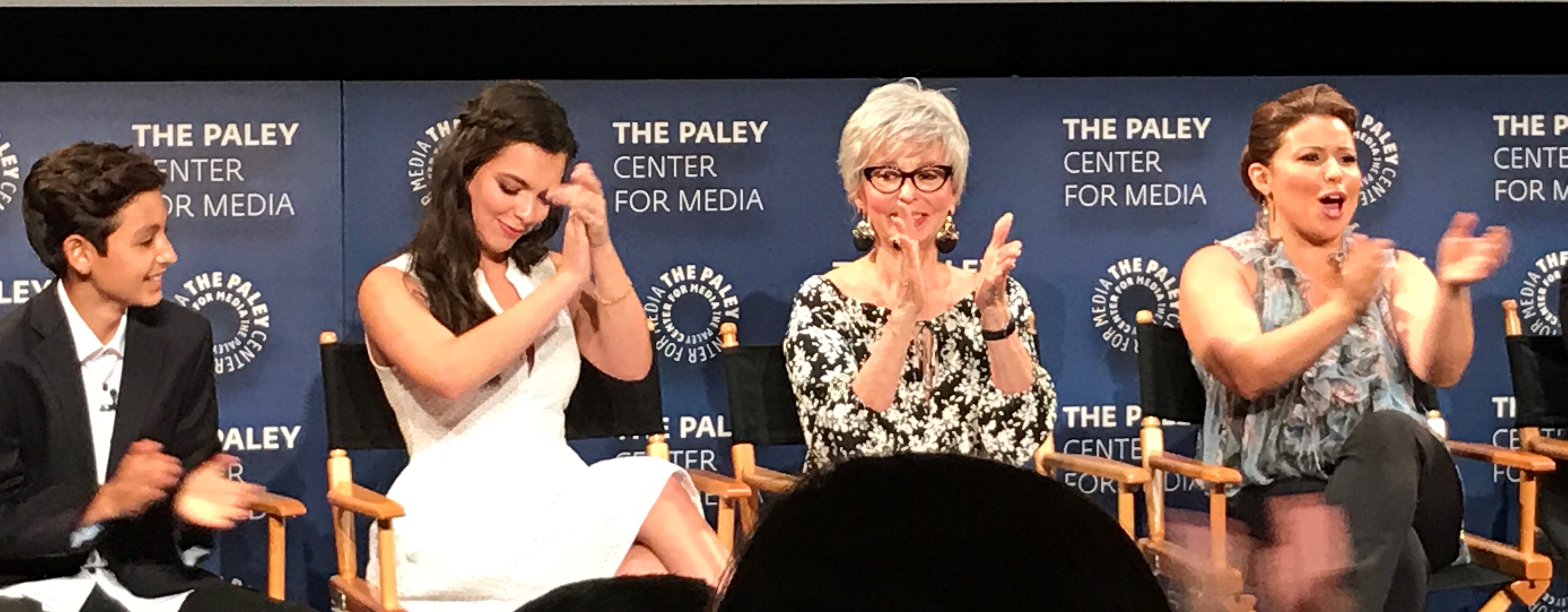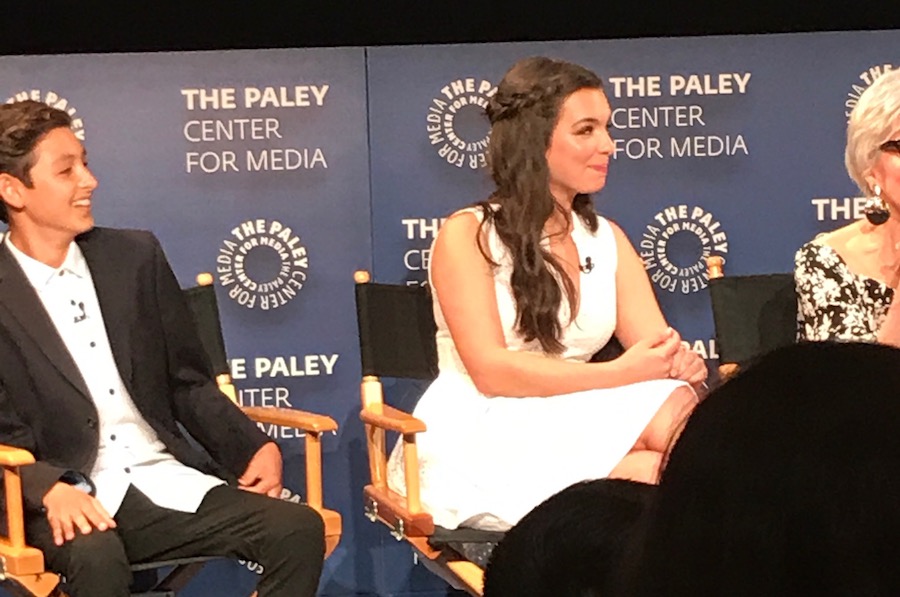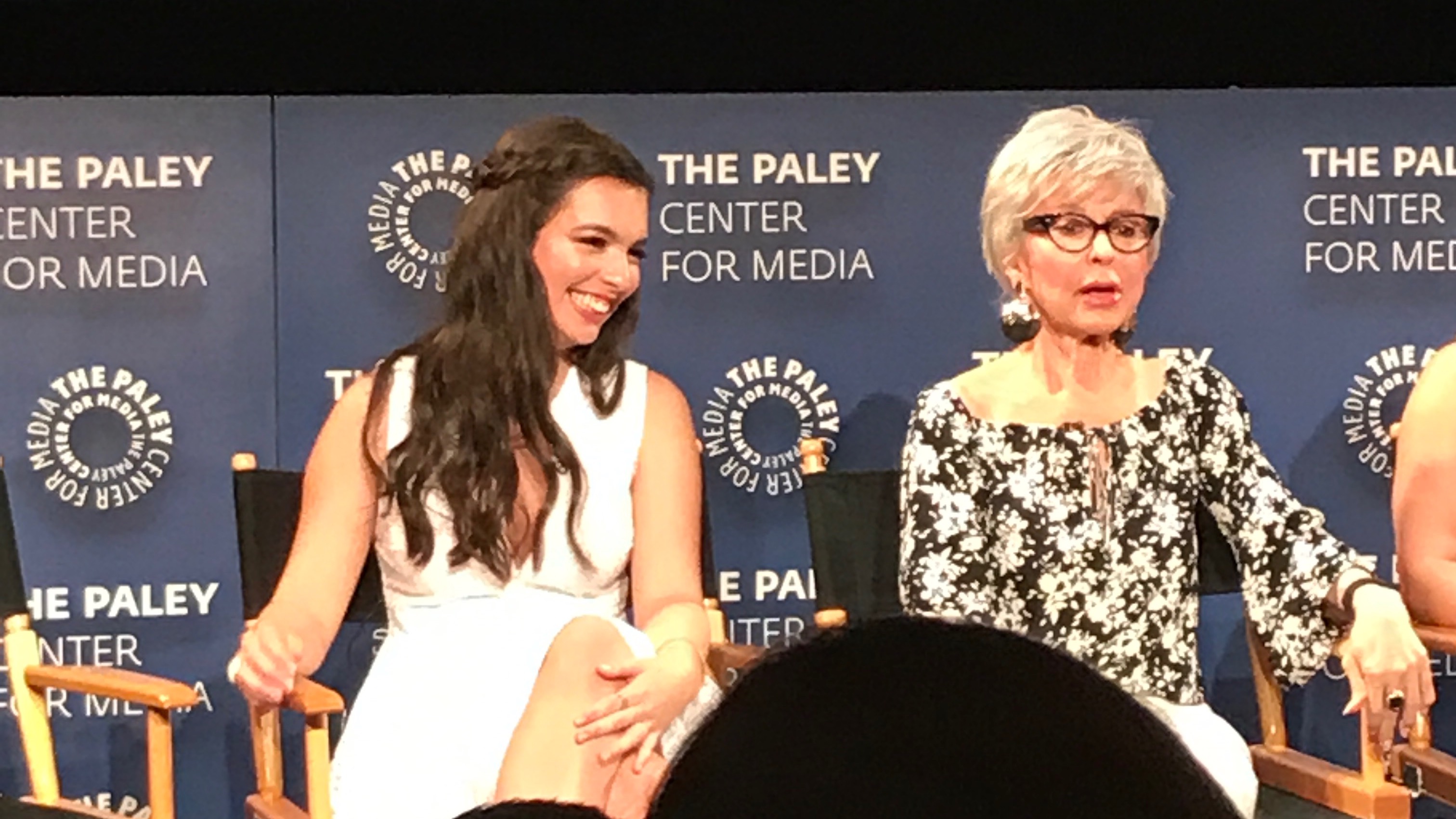As a big TV fan (I know you’re shocked), when I heard that One Day At A Time was added to the Paley Live schedule for 2017, I had to go. On May 4th my wife and I went to the Paley Center in Beverly Hills to see “An Evening with One Day At A Time.”
We’d been up there before, a few years ago for the CSI finale, which was a hectic and crazy affair with lines wrapping around the block. This was curiously less crazy and yet more family. Which I suppose is the point of the show.
The evening started with us watching an episode, the “Quinces” which was the season finale. I’ve obviously seen it before, but there is a magic that happens when you all watch something together. Suddenly the laughs become bigger, the tears fall faster, and you all share the message and the meaning in a simple sitcom. After that, the cast walked out on stage.
The Panel
The moderator, who was perfectly lovely, started by accidentally reading Isabella’s last name (Gomez) when introducing Marcel (Ruiz), and that set off a series of jokes that didn’t stop until the end. Everyone was free with the quips, including Norman Lear who sat on the end looking like he was napping.
Schnieder’s actor (Todd) was on his honeymoon and sent a funny video instead. Next the prepped questions started.
Why Now?
Norman Lear was asked why a Latino version of the show and why now, but he deferred to Brent Miller, saying “Brent asked me how about a Latino version of One Day At A Time?” Brent started to explain why, and Rita Moreno cut in asking him to tell us about the study.
Apparently there was a study done by Coca-Cola, where they were trying to figure out who to market to next. The fastest growing audience was single Latina mothers with two children. From there, everything fell into place. There was very little representation of authentic Hispanic families on TV. I believe they came up with three shows, one of which being Jane the Virgin), and none took place in Los Angeles.
Even the writers’ room is half Hispanic and half “human people” said executive producer (EP) Gloria Calderon Kellett. She and Mike Royce (whom Rita Moreno teased as being “not Hispanic”) as the EPs were the driving forces for a lot of things.
On Being On the Show
Rita Moreno explained she’d always been a fan of Norman’s work, and when she met him, they became instant friends. Norman immediately made a joke Rita was now pregnant.
Isabella Gomez, our darling Elena, said that she met and started working with Rita and Norman before she really understood them as the legends they are. And that was good, because she would have been a nervous wreck otherwise. Instead, she demanded Rita become her mentor, and loved Justina Machado like a mother.
Marcel Ruiz was nervous, but Rita treats him like her grandson. That prompted Isabella to joke that Marcel was Rita’s favorite. Rita replied “I love little boys!” and brought down the house.
Justina Machado talked about how she and Rita had worked together before, which Rita claimed not to remember. Then Rita explained that for a group of people who had never worked together before, they had amazing chemistry and it had only gotten deeper. Justina went on to say that Rita broke down doors and everyone loved her. Rita attempted to say something nice about Justina, but Justina kept interrupting, prompting Rita to say “I’m trying to say something nice about you, you little shit!”
Justina listens like no one I’ve worked with. She knocks me out. It’s so organic. I love her. But she is a little shit sometimes.
— Rita Moreno
Keep it Clean
Norman was the cause for the ‘no swearing’ rule for the show. That did not hold true for the panel, as Rita Moreno proceeded to say “Shit” as many times as possible. Rita was the one cast member who had a dirty word in the script, and it was removed. Rita pointed out she based Lydia on her own mother who would say “Change the shits” (sheets…).
By the way, if you want to feel like you were there, just read this recap filled with interjections from your sassy aunt, Rita Moreno, and implied dirty jokes by your grandfather, Norman Lear.
As Different as the Two Schniders
Norman said that the shows weren’t the same at all. They had the same name, they were about a single mother and her family, and that was it. Unlike the original show, the remake planned out the season in advance. They crafted the storylines to flow. Since they knew everyone was going to binge the show, they didn’t have the advantage of making specific episodes topical. And yet they totally were.
And then. Finally. It was time for the audience.
The Q&A
The questions started with a wonderful woman from Puerto Rico who was effusive in her thanks for the show. She saw her own family reflected.
Someone else asked about guest stars, and Rita Moreno went on record saying she hoped the show wouldn’t have a lot of guest stars. The heart of the show was family, not the big name of the week. Norman Lear mentioned that the only guest he really ever had was Sammy Davis Jr., and that was because Sammy wouldn’t stop bugging Norman about a gig! Justina Machado wanted the guests to be unknowns. “I’d like to be the show that helps discover great Latino talent.”
Another audience member asked if they worried about using too much Spanish. Gloria Kellett replied that if she said something in Spanish and the non-Spanish speaking writers laughed, it stayed in. After all, if she could look up “Bar Mitzvah,” they could Google. Mike Royce explained that comedy has a rhythm. “When a character speaks Spanish, you know when it feels right.”
A young man from Cuba said he learned about America from Lear’s shows, and we all cheered.
Our Time Was Up
At this point, our time was technically up. The timer went off and the cast looked sad and the moderator looked sad, and I, who had raised my hand a few times, was sad.
And then a miracle occurred. Norman and Mike said to keep going and everyone would pick one more person to hear talk. So I raised my hand and Mike Royce pointed at me.
I stood up with the mic and started by mentioning that forty years ago, there was an episode of All In The Family about Cousin Liz. I could see Norman Lear startle a little, and the producers nodded. They knew where I was going. That was, I said, one of the first times many people heard about lesbians. And now, here, forty years later we have a show that is something I could have used as a kid. Where a family dealt with the change with love, where they struggled, but still they loved.
I thanked them for doing that here and now, when we need it more than ever. Because I run a website (this one) with my friend, and we track all the queer females on television. And there aren’t as many as you’d think, and few have happy endings. Many die. And knowing that wasn’t going to happen on this show gave us all hope. I did try to joke “She’s not dying, right?”
A Few More Questions…
I admit the next ten minutes were a bit of a blur. Someone asked Marcel about the fame, and he said by the time he got back to school, all his friends had watched the show and wanted to know about season two. Another woman started to talk in halting English, until we all encouraged her to just use her native Spanish; she wanted to thank the writers. Rita joked that for those of the audience who didn’t understand Spanish, the woman had said wonderful things about Rita, while Norman asked for it to be repeated in Yiddish.
The cast was asked about how hard a job it was and had they every thought about not doing a multi-camera show. Gloria Kellett said no. The show was hard, yes, and the cast had to learn a new play every week and perform it for a live audience. But, as Rita pointed out, there’s a magic of working in front of a live audience.
The cast was also asked about their inspirations. Gloria explained that hers was her own life. That Cuban Americans in LA and San Diego don’t sound like those in Miami because of the multiple different kinds of Latinos in the area. They’re a melange. Even so, Justina Machado and Gloria Kellett’s 23 & Me’s were nearly identical! Next season they plan to talk about race a little more; as Gloria said, “I didn’t know I was brown until we moved to California.”
Socializing
The lights came up and we went down to try and meet the cast and crew. I immediately (accidentally!) bumped into Norman Lear so I shook his hand and said thank you. But we’d run so far over it was no more than five minutes before the cast was swept away. I didn’t get to say thank you to Isabella or Rita or Justina. But instead, I found myself thanked by many audience members. Some told them I’d made them cry a little. Others thanked me for saying what was in their hearts as well.
This includes Executive Producer Mike Royce! He stayed behind to talk to some of the audience, and took the time to thank me for saying that. That it helped them to hear they’d helped somehow.
Besides Mike, I talked to a few crew members. They too wanted to thank me, and we talked about how representation matters in so many ways. Seeing yourself on the television helps. A lot. This is true of queers but also single parents and Latinos and veterans and more. They talked about PTSD and being poor without being broke and on and on. It touched all of us in different ways.
Afterwords
One of the reasons I like this show so much is that we’re not the joke. While it films in some of the same, traditional, manners as popular shows like The Big Bang Theory, the main difference is the love. It was clear from the second they stepped on stage that everyone on that show likes each other. Rita Moreno was their brilliant, bawdy, hilarious aunt, teasing everyone (she called Justina Machado a “little shit” at least four times).
But with all the laughing and all the jokes, being gay isn’t the joke.
That’s been my biggest issue with The Big Bang Theory and other modern comedies. The joke is Sheldon and Raj and how they’re ‘weird’ or different. They make jokes that’s funny to like comics as an adult (it’s not), or that liking science makes you strange (it doesn’t). The joke is the fact that the main characters are weird.
There wasn’t a single joke that was about Elena being gay. There were jokes about everyone else, but the punchline wasn’t “Hur hur lesbian!” The joke was Lupe gave the wrong sex talk to the wrong kid twice. The joke was Elena watching Twilight for Kristen Stewart becuase “It sure wasn’t the plot.”
What a Sitcom Should Be
I used to say that I didn’t think One Day At A Time was a sitcom. I’d say it was a comedy, but it’s not about situations, it’s about family. The more I think about it, the more I think it’s a sitcom in the truest form. The joke is the situation, not the people. And the people are in on the joke.
Maybe that’s why I can laugh at this show freely.




